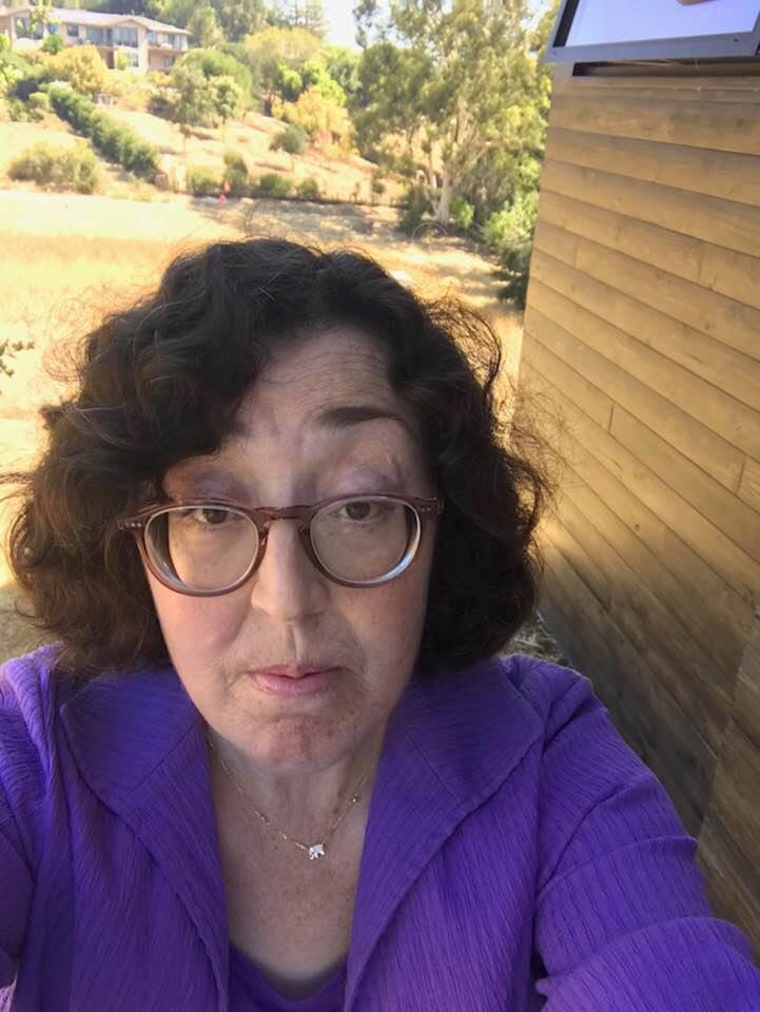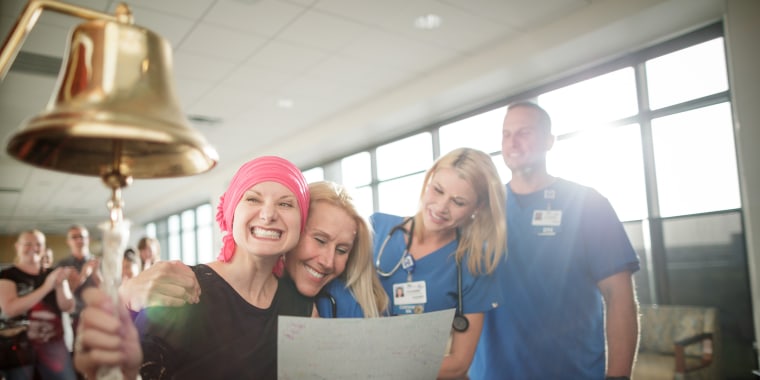Like many cancer patients finishing their treatment, Alexsandra Dietrich rang a bell at her clinic to mark the end of chemotherapy.
“It was one of the best days of my life,” Dietrich, 22, told TODAY last year, her voice breaking. “I was overwhelmed with happiness… Every time I went to chemo, I saw the bell [and] it gave me the sense of hope that one day I’m going to be able to ring it and I don’t ever have to come back.”
Dietrich, an Ohio State University student, was diagnosed with Hodgkin's lymphoma in February of 2018 when a lump suddenly popped up in her neck. She had to move back home to Florida and endure chemotherapy every other Tuesday for six months. It left her “helpless” every time for the next few days afterwards, she said.
So on that last day of chemotherapy in August of 2018, Dietrich — surrounded by her family and medical team — wept as she rang the celebration bell at the Moffitt Cancer Center in Tampa, Florida. The powerful moment went viral, with the video featured on TODAY:
The bell ringing ritual at the end of chemotherapy or radiation has become common in hospitals and clinics across the country. Patients proudly post the videos online. But the joyous celebrations have their critics who say they lack sensitivity and have no place in facilities where others with no hope for a cure can see or hear them.
In every chemotherapy infusion suite, there are cancer patients who will never finish treatment. They may be dying or have to endure brutal chemotherapy for the rest of their lives. It's “insensitive to have a dance party” in front of them, wrote Katherine O'Brien, a patient advocate with the Metastatic Breast Cancer Network, on LinkedIn. She’d rather see the staff quietly hand out certificates of completion.

O'Brien, who was diagnosed with stage IV breast cancer in 2009, is on her fifth line of treatment as the cancer has spread to her bones and liver. Her treatment is for life. She doesn’t go to her clinic looking to be offended, she said, but she’s taken aback by the lack of acknowledgment that not everyone has early stage breast cancer and will finish their treatment.
“I understand… it’s such a good feeling to know that you’re done. But unfortunately, that’s not the case for everyone,” O'Brien, 53, told TODAY.
“People are happy for those who finish their treatment, but they’re sad for themselves. It’s often hard not to feel a pang of sadness or maybe even jealousy — ‘I wish that was me, I wish I could do that, I wish I could join that celebration, but I can’t.’
O'Brien’s friend in the online community of Breastcancer.org told her about watching a bell ringing ceremony that involved balloons and lots of happy family members. “Couldn’t that have happened in the parking lot?” she asked.
“To me the bell is a way of screaming ‘I am OK, treatment is done, and I have my life back!!’ Great. For you,” wrote Judit Saunders, a Calgary woman living with metastatic breast cancer, in her blog.
“Have you taken a minute to look around your infusion room? Do you know how many of these people are simply trying to extend their lives at the expense of horrific side effects you couldn't even comprehend to simply live a little bit longer? When you ring that bell, it reminds those of us in treatment forever what will never be. How unlucky we truly are.”
The bell setup varies. In some clinics, it’s installed at the nursing station in the middle of the infusion suite; in others, in the lobby or a hallway.
'Courage to continue'
At the Moffitt Cancer Center in Tampa, the bell has been available outside the entrance of the infusion center since 2011. Krissy Frantz, RN, the clinic operations manager, said she’s never received any negative feedback from patients about it, but would address any concerns if they arose and appreciates the feedback.
“When people hear the bell being rung, it offers them hope and gives them courage to continue,” Frantz said. “The patients who are here seem to be happy for those other patients.”
Besides marking the end of treatment, patients can ring the bell to celebrate other milestones like receiving a scan that shows improvement, undergoing tests that confirm the cancer is under control or even celebrating a birthday “because it’s important to them that they get to their next birthday,” she noted.
A staff member whose mother underwent treatment but passed away came back to ring the bell in honor of her parent, Frantz added.
At other clinics, the medical staff has decided to tone down the ritual.
"We realized this isn't a celebration for everyone — so we are now purposeful and sensitive when we do this," Bonita Ball, a nurse manager at a chemotherapy unit at Pennsylvania Hospital in Philadelphia, told Medscape Medical News.
O'Brien would like to see hospitals and clinics do more to acknowledge people who may never finish treatment. October 13 is National Metastatic Breast Cancer Awareness Day, for example — why not have a sign or display honoring those patients, she asked.
Dietrich, who returned to Ohio State University after treatment, was glad the differing viewpoints are being heard.
“People like me have the privilege to get to ring the bell… maybe [doctors] should look into doing something for patients who don’t get that privilege,” she said.
